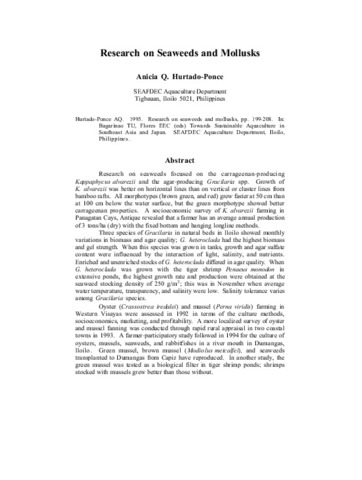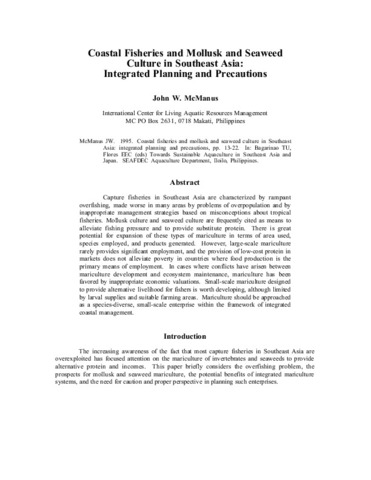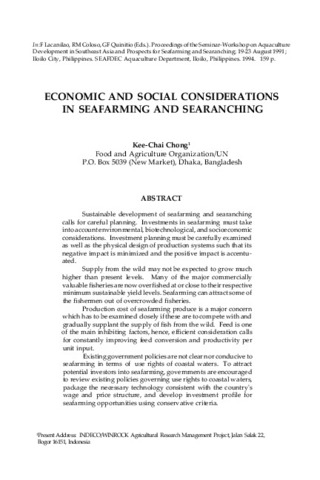Evaluation standard for assessing mariculture parks
- Global styles
- MLA
- Vancouver
- Elsevier - Harvard
- APA
- Help

View/
Preview (Limited to 10 pages)
evaluation standard for assessing MPs-final.pdf (2.253Mb)
 Restricted Access
Restricted Access
 Restricted Access
Restricted Access
Downloads: 2
Date
2013-07Author
Page views
2,333ASFA keyword
Metadata
Show full item record
Share
Description
The Evaluation Standard for the Sustainable Mariculture Investment Program (SMIP) of the Development Bank of the Philippines (DBP) is designed to provide an objective and detailed mechanism for assessing investment opportunities in MPs. The social, ecological and institutional dimensions in MP operations will have to be balanced. This will not only ensure stable financial returns to the investors and lending institutions but will also protect the marine environment for sustainable economic development. The techno-ecological factors are primary indicators to determine whether a candidate site is suitable for mariculture. If the site does not meet the techno-ecological criteria, there is no reason to pursue the MP. If the site meets these criteria, the social, economic and policy issues are then assessed and analyzed to measure the investment portfolio of each component in the value-chain of mariculture, measure the social and economic benefits to the community, and establish the required institutional and policy support from the government in order to set the rules and rights in the MP operations.
The Evaluation Standard for Assessing Mariculture Parks is a straight-forward and easy-to-use instrument. It will require, however that loan evaluators are familiar with technical terms and analytical procedures. This can be acquired through training and actual field exposure. Although the figures presented in the tables are recommended by the Consultants, there is flexibility in the assignment of points depending on the situation in the field and other factors that may not have been included in this study.
Suggested Citation
SEAFDEC/AQD. (2013). Evaluation standard for assessing mariculture parks. Aquaculture Department, Southeast Asian Fisheries Development Center.
Type
BookFormat
26 pages : color illustrations.
Collections
Related items
Showing items related by title, author, creator and subject.
-
Research on seaweeds and mollusks
Hurtado-Ponce, Anicia Q. (Aquaculture Department, Southeast Asian Fisheries Development Center, 1995)Research on seaweeds focused on the carrageenan-producing Kappaphycus alvarezii and the agar-producing Gracilaria spp. Growth of K. alvarezii was better on horizontal lines than on vertical or cluster lines from bamboo ... -
Coastal fisheries and mollusk and seaweed culture in Southeast Asia: Integrated planning and precautions
McManus, John W. (Aquaculture Department, Southeast Asian Fisheries Development Center, 1995)Capture fisheries in Southeast Asia are characterized by rampant overfishing, made worse in many areas by problems of overpopulation and by inappropriate management strategies based on misconceptions about tropical fisheries. ... -
Economic and social considerations in seafarming and searanching
Chong, Kee-Chai. (Aquaculture Department, Southeast Asian Fisheries Development Center, 1994)Sustainable development of seafarming and searanching calls for careful planning. Investments in seafarming must take into account environmental, biotechnological, and socioeconomic considerations. Investment planning must ...




